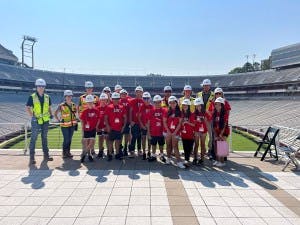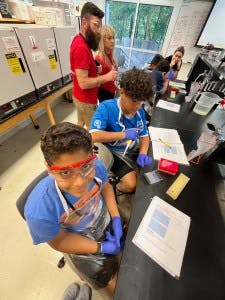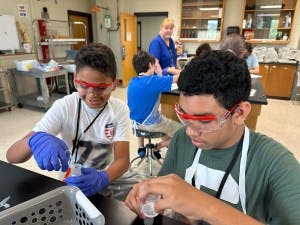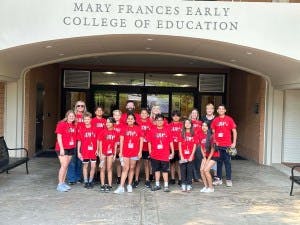Picture this—a group of scientists coming together on UGA’s campus to learn about genetics, predict genotypes with Punnett squares, and separate mixtures of DNA using gel electrophoresis.
Now picture these scientists as middle-grade learners from diverse and multilingual backgrounds.
To help make this image a potential reality for young learners, the researchers behind siSTEMas (Stimulating Immersive Science Through Engaging, Motivating, and Authentic Scenarios) created a five-day summer camp for underserved students, particularly Latinx learners.

These middle-grade students received hands-on experience conducting science research at the College’s inaugural siSTEMas Camp—a $1.3 million joint research and outreach project led by principal investigator and associate research scientist Georgia Hodges (B.S. ’99, M.Ed. ’03, Ph.D. ’10) in the Department of Mathematics, Science, and Social Studies Education.
“It’s very important for students to know that you don’t have to look a certain way and that you don’t have to be a specific gender to do STEM,” says Hodges. “The exciting thing is we saw transitions from kids saying, ‘No, I’m not a scientist’ to ‘I really can be a scientist.’ We’re going to follow these kids into the classroom and see if they see themselves as leaders and if the camp impacts them long term.”
As Latinx multilingual learners represent only 7% of the STEM workforce, addressing issues at the beginning of the STEM pipeline when children are deciding whether STEM is a possible pathway for them is just one of several goals the siSTEMas team hopes to achieve in the next five years.
Hands-on learning
This summer, 25 students participated in the camp, with the first session running in June and the second in July. Researchers used the first session to determine any needed changes or adjustments to help the second group of students better grasp scientific concepts.
The campers conducted experiments in UGA’s genetics lab with doctoral student and lab manager Shaugnessy McCann (M.A.T. ’16, Ph.D. ’25) and learned how to extract strawberry DNA and collect samples of water from a turtle pond to observe under a microscope.
“These kids ran their own experiments, and they can do it,” says Hodges. “This is what everybody needs to know—kids can do it. If you tell people that we had sixth graders running their own gels, they’d say, ‘No, that’s way too complicated and hard for kids today.”
In addition to learning about genetics in both English and Spanish and handling tools that middle-grade students might not normally use in traditional classroom settings, the campers met with different scientists each day during lunch in the dining hall.
These scientists—which included graduate students, professors, and research scientists at different stages of their careers—shared their personal experiences in the STEM field and answered questions about what it’s like to be a researcher in their field of study.
“Part of the camp was designed to support students seeing themselves in science,” says McCann. “Recognition as a scientist is so important, and we’ve seen them shift from not being interested in science and not feeling recognized in science to saying that they’re interested in science and in science careers.”
Machine learning
Funded by the National Institutes of Health (NIH), the siSTEMas study also gives Hodges and her team the opportunity to expand Virtual Vet, an interactive digital learning game, for a more diverse student population.
Developed by Hodges and her team for another NIH study, the updated version of Virtual Vet will contain four new gameplay levels for middle-grade learners and support play in Spanish with a read-aloud functionality. The game levels address genetics concepts that teachers and researchers identify as difficult for middle-grade learners to understand.
“The analysis of student learning outcomes from the camp will inform the design of the new game levels,” says Hodges. “The main goal of the team’s design process is to create immersive environments that hands-on science activities cannot provide, including gathering data about multiple generations to examine genetics concepts.”
Students spend enough time in front of a computer, adds Hodges, so the team is strategizing on how best to build these learning environments by using new technologies, including machine learning and AI, to broaden the reach of the gaming environment.
“I believe that machine learning and artificial intelligence can help us and basically multiply the effect of the teacher,” says Hodges. “You can’t replace a teacher with an immersive environment, and we have data to support that. Instead, what we’re looking to do with machine learning is to multiply the teacher and provide them with resources.”
Currently, Virtual Vet contains around 150 assessment items, and students are provided with real-time feedback on student responses. The next iteration will provide students with tailored assessments and feedback during gameplay and teachers with more nuanced information about student learning during gameplay.

Thanks to siSTEMas’ partnership with six school districts, more than 6,000 students will receive access to Virtual Vet for both elementary and middle-grade students.
Over the next few months, the research team—which includes doctoral student Ngutor Tembe (Ph.D. ’25)—will analyze videos and other data gathered from the siSTEMas Camp to examine multiple factors, including student knowledge, student attitudes toward science, student interest in pursuing a science field, and student mindset towards learning science in a multilingual, digital environment.
“We’re looking to use virtual and machine learning algorithms to actually look at constructed responses and see how we can—in English and Spanish—support multilingual learners using machine learning to give feedback that students can use to make sense of science,” says Hodges. “In the future, we want to bring our campers in as mentors, so that they can see themselves as leaders and meet new scientists. Students really like the attention and recognition of being valued and having their knowledge valued.”
